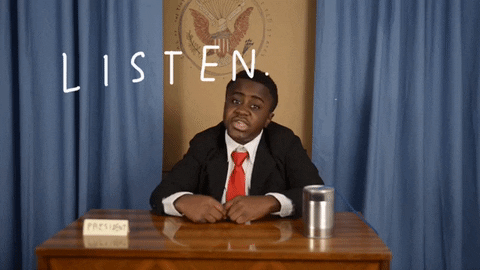 |
| Photo by Mimi Thian. |
I want to get better at active listening.
I started to learn that my listening wasn't as "active" as it could be about a year ago. I was in counselling with my former partner and our counsellor used a technique for communicating about difficult issues where one person would get free reign to share what was going on for them and the other person's job was to simply listen, ask questions, and summarize what they were hearing. They were not allowed to offer their own experience, analysis, or advice - they are simply there to provide the space to talk.
Here was my problem: I would sit quietly and pay attention while he talked and then ask questions, but my questions weren't great. Sometimes I came up blank and couldn't even think of a question. More often, they were crafted in a way to make a point instead of deepening understanding. It was more, "have you ever thought about doing it this way?" and less, "how does that make you feel?"
On the flipside, my partner was GREAT at asking insightful, curious questions that helped me deep-dive into whatever I was talking about when I was sharing.
Then I began to notice that some of my friends are equally fantastic at active listening. They always seem totally curious and are always brimming with sincere, interested questions for everyone around them.
 |
| Giphy |
Here are two places where I know I go wrong with active listening:
1) I do that fun anxiety-brain thing where you are spending about 20% of your brain's processing power worrying about how you're coming across instead of actively engaging in the conversation.
(I have had it pointed out to me multiple times, even from near-strangers, that people can tell I care too much what other people think of me... So this is DEFINITELY a thing.)
2) I often think I fully understand the point that's being made before it's done. My brain jumps ahead, says, "yep, I've got it!" and is ready to share my analysis or counterpoint or simply agree and move on.
But chances are I don't have it. Chances are there is a lot more I can learn. Also, chances are there is a lot more to conversing with someone than just understanding the point they are making and then moving on with your life.
The majority of advice on active listening boils down to being curious, which is great but also that's what I was trying to do in my counselling sessions when I would sometimes not even be able to come up with a question to ask. So obviously I need to find some more specific inroads to break these habits in my brain.
 |
| Giphy |
After reading around about active listening, here are a few things I'm going to try:
Relax and remind myself I'm okay.
Why do I feel the need to talk too much in the first place? Because I am compensating for some ever-present insecurity and wanting people to see me in a certain way: interesting, clever, wise, someone they would turn to for advice.
I don't need to prove I deserve to be in a conversation, though. It's okay. I'm okay.
(I mean, if it's obvious enough that strangers can pick it up after an hour in the same room, then yeah... I need to relax.)
Who, what, where, when, why, and how.
Remember these basic questions? I am going to drill them into my mind so that when I am coming up blank on a question (not because I'm not curious about what's being shared but because my brain is being annoying), I have something to fall back on.
Is there more?
This came to me from Rad Reads, who got it from the book Getting the Love You Want. Here, you just ask the person "is there more?" and give them the space to talk. Do it three times.
The thing with this one is that it's intended for couples who know that this is a thing they are doing, and in that context, it makes perfect sense. It might be weird to just ask "is there more?" to a person in conversation at a cocktail party. Perhaps there's a rephrase that will achieve the same purpose without being a bit awkward? Hit me up if you can think of one!
Become an interviewer
It occurs to me that when I have been in a position to interview someone I have had no trouble listening and coming up with questions to probe deeper. Probably because it was my one job to listen and ask questions, and I was focused on that instead of my own dang self.
Maybe I just need to shift my mindset and pretend I'm interviewing everyone I talk to? (I feel like there might be other unwanted implications to this, but heck, it's worth a try!)
Do you have any tricks you've picked up over the years to help your active listening? Or did it just come magically and easily to you because you are a super-unicorn-rainbow listener?
Sign up for my email newsletter for a bi-weekly digest and bonus content!

No comments:
Post a Comment